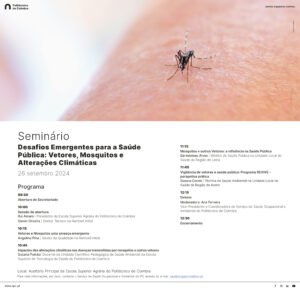![]() No âmbito da comemoração do Dia Nacional da Sustentabilidade e do Dia Mundial da Saúde Ambiental, que se celebram nos dias 25 e 26 de setembro, respetivamente, irá decorrer o Seminário “𝐃𝐞𝐬𝐚𝐟𝐢𝐨𝐬 𝐄𝐦𝐞𝐫𝐠𝐞𝐧𝐭𝐞𝐬 𝐩𝐚𝐫𝐚 𝐚 𝐒𝐚𝐮́𝐝𝐞 𝐏𝐮́𝐛𝐥𝐢𝐜𝐚: 𝐕𝐞𝐭𝐨𝐫𝐞𝐬, 𝐌𝐨𝐬𝐪𝐮𝐢𝐭𝐨𝐬 𝐞 𝐀𝐥𝐭𝐞𝐫𝐚𝐜̧𝐨̃𝐞𝐬 𝐂𝐥𝐢𝐦𝐚́𝐭𝐢𝐜𝐚𝐬”.
No âmbito da comemoração do Dia Nacional da Sustentabilidade e do Dia Mundial da Saúde Ambiental, que se celebram nos dias 25 e 26 de setembro, respetivamente, irá decorrer o Seminário “𝐃𝐞𝐬𝐚𝐟𝐢𝐨𝐬 𝐄𝐦𝐞𝐫𝐠𝐞𝐧𝐭𝐞𝐬 𝐩𝐚𝐫𝐚 𝐚 𝐒𝐚𝐮́𝐝𝐞 𝐏𝐮́𝐛𝐥𝐢𝐜𝐚: 𝐕𝐞𝐭𝐨𝐫𝐞𝐬, 𝐌𝐨𝐬𝐪𝐮𝐢𝐭𝐨𝐬 𝐞 𝐀𝐥𝐭𝐞𝐫𝐚𝐜̧𝐨̃𝐞𝐬 𝐂𝐥𝐢𝐦𝐚́𝐭𝐢𝐜𝐚𝐬”.
![]() O evento será realizado no próximo dia 26 de setembro, no Auditório Principal da Escola Superior Agrária de Coimbra (ESAC – IPC)
O evento será realizado no próximo dia 26 de setembro, no Auditório Principal da Escola Superior Agrária de Coimbra (ESAC – IPC)




